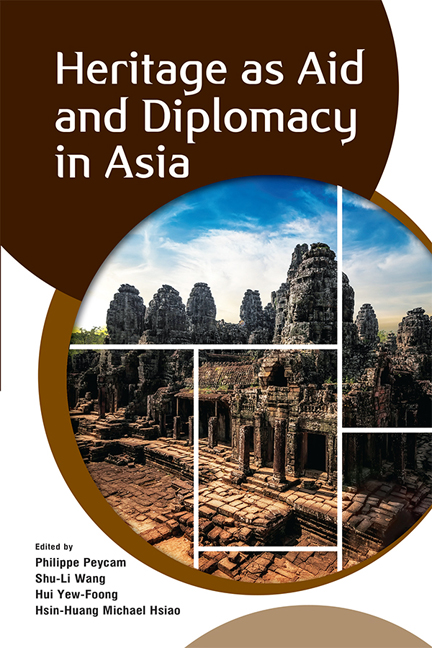Book contents
- Frontmatter
- Contents
- Contributors
- 1 Heritage as Aid and Diplomacy in Asia: An Introduction
- 2 World Heritage and WikiLeaks: Territory, Trade and Temples on the Thai-Cambodian Border
- 3 Heritage Making – Aid For Whom? The Genealogy of Expert Reports in the Hands of Politics and Their Impact in the Case of Preah Vihear
- 4 The International Coordinating Committee for Angkor: A World Heritage Site as an Arena of Competition, Connivance and State(s) Legitimation
- 5 Legacies of Cultural Philanthropy in Asia
- 6 To Help or Make Chaos? An Ethnography of Dutch Expertise in Postcolonial Indonesia
- 7 Heritage Conservation as a Tool for Cultural Diplomacy: Implications for the Sino-Japanese Relationship
- 8 From Ideological Alliance to Identity Clash: The Historical Origin of the Sino-Korean Goguryeo Controversies
- 9 Nationalism, Politics and the Practice of Archaeology in Afghanistan: A Case Study of Bamiyan
- 10 Disappearing Voices: The Politics and Practice of Safeguarding Kunqu Opera in the People’s Republic of China
- 11 Neoliberalizing Heritage: International Agencies and the Local Dynamics of Heritage Conservation in Bali, Indonesia
- 12 Heritage Conservation as Trickle-Down Development
- Index
3 - Heritage Making – Aid For Whom? The Genealogy of Expert Reports in the Hands of Politics and Their Impact in the Case of Preah Vihear
Published online by Cambridge University Press: 10 November 2020
- Frontmatter
- Contents
- Contributors
- 1 Heritage as Aid and Diplomacy in Asia: An Introduction
- 2 World Heritage and WikiLeaks: Territory, Trade and Temples on the Thai-Cambodian Border
- 3 Heritage Making – Aid For Whom? The Genealogy of Expert Reports in the Hands of Politics and Their Impact in the Case of Preah Vihear
- 4 The International Coordinating Committee for Angkor: A World Heritage Site as an Arena of Competition, Connivance and State(s) Legitimation
- 5 Legacies of Cultural Philanthropy in Asia
- 6 To Help or Make Chaos? An Ethnography of Dutch Expertise in Postcolonial Indonesia
- 7 Heritage Conservation as a Tool for Cultural Diplomacy: Implications for the Sino-Japanese Relationship
- 8 From Ideological Alliance to Identity Clash: The Historical Origin of the Sino-Korean Goguryeo Controversies
- 9 Nationalism, Politics and the Practice of Archaeology in Afghanistan: A Case Study of Bamiyan
- 10 Disappearing Voices: The Politics and Practice of Safeguarding Kunqu Opera in the People’s Republic of China
- 11 Neoliberalizing Heritage: International Agencies and the Local Dynamics of Heritage Conservation in Bali, Indonesia
- 12 Heritage Conservation as Trickle-Down Development
- Index
Summary
Introduction: Expert Knowledge and Political Settings
As is well known, UNESCO is an international organization with an educational and cultural governance mandate to achieve a more equal and peaceful world through altering the minds of men (Nielsen 2011, p. 275). All UNESCO conventions dealing with “heritage” aim at contributing to these overarching idealistic goals. At the core of Operational Guidelines to the 1972 World Heritage Convention are the criteria that nominations must fulfil in order to reach approval by the Intergovernmental Committee (IGC). The first and foremost criterion a monument, a group of buildings or a site must fulfil is that of “Outstanding Universal Value” from the point of view of history, art or science. A number of circles of experts at both the national and international level are involved in the nomination and listing process. At the national level, such experts are charged with the task of describing and documenting the cultural property for the nomination file in such a way that the delegates of the member states constituting the Intergovernmental Committee to the Convention become ultimately convinced of its quality. UNESCO, on the other hand, cooperates with a number of international expert bodies such as the International Council on Monuments and Sites (ICOMOS), the International Centre for the Study of the Preservation and Restoration of Cultural Property (ICCROM) and the International Union for Conservation of Nature (IUCN). Their experts, whose names are kept confidential, evaluate the nomination with regard to the fulfilment of the criteria and submit a recommendation to the IGC, where decisions are made. Though expert reports claim to focus exclusively on the quality of the cultural property (mostly monuments) and to stand above politics, the expertise expressed in them is often situated in a highly political context, which, as I am going to show, can lead to unforeseen consequences. These mostly implicit and invisible conditionings of expertise often divert UNESCO's noble goals and produce other socio-political results than those intended.
The politicization of the cultural property already begins when experts are called into action and they obediently seek to fulfil their task. This applies most strikingly to the ruins of the former Hindu Temple of Preah Vihear on the Thai-Cambodian border.
- Type
- Chapter
- Information
- Heritage as Aid and Diplomacy in Asia , pp. 52 - 77Publisher: ISEAS–Yusof Ishak InstitutePrint publication year: 2020



